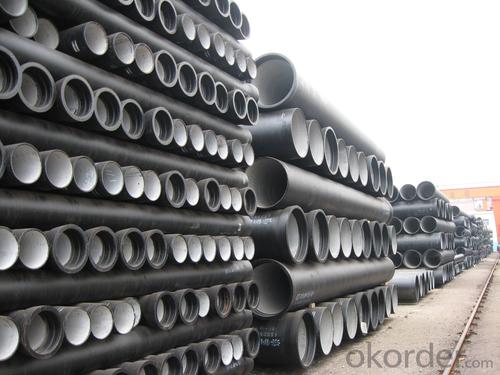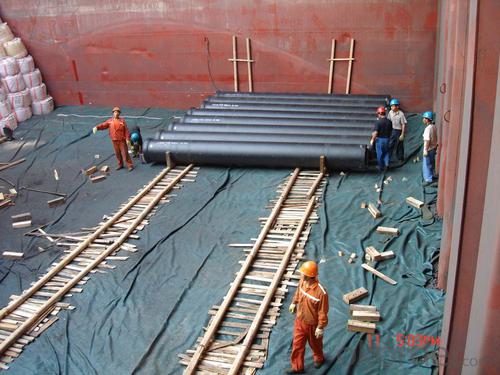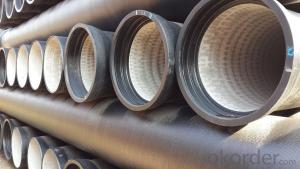Ductile Iron Pipe DN700
OKorder Service Pledge
Quality Product, Order Online Tracking, Timely Delivery
OKorder Financial Service
Credit Rating, Credit Services, Credit Purchasing
You Might Also Like
Specifications
Quick Details
| Place of Origin: | China (Mainland) | Brand Name: | CMAX | Model Number: | T type / K type / Flange type |
| Length: | 6m / 5.7m / Negotiable | Standard: | ISO2531 / EN545 / EN598 | Application: | Potable / Sewage water |
| Diameter: | DN80~DN2200 | Shape: | Round | Hardness: | 230 |
| Pipe Wall Thickness: | standard | Pull Strength: | 420 | Yield (≥ MPa): | 300 |
| Material: | Ductile Iron | Type: | Centrifugal ductile cast iron pipe | Certification: | ISO2531 / EN545 / EN598 |
| Outer Diameter: | 80-2200 | Thickness: | standard | Specification: | DN80~DN2200 |
| |
The advantages to the customer:
Trustworthy financial strength.
One-stop shopping.
Fast and efficient service.
Coordination of shipments from multiple plants.
Specialists of the overseas shipping process.
A more competitive price.
- Q: Is it better to use steel tubes or ductile iron pipes for water supply?
- You need a definite environment to say which kind of pipe is good!1, ductile iron pipe is cheap, corrosion resistance, lack of toughness is poor, not easy to process;
- Q: How are ductile iron pipes tested for quality?
- Various methods are employed to test the quality of ductile iron pipes, ensuring they meet required standards and specifications. One commonly used test is the hydrostatic pressure test, wherein the pipes are subjected to high-pressure water or other liquids to detect leaks or weaknesses. Water is typically used to fill the pipes, with the pressure gradually increased to a predetermined level. This test effectively identifies potential defects that could compromise the pipes' integrity. Another important quality test for ductile iron pipes is the tensile test. This involves pulling a sample of the pipe until it breaks, measuring the applied force and elongation. By doing so, the pipe's tensile strength and ductility can be determined, ensuring it can withstand required loads and stresses without deformation or failure. In addition to these tests, other quality checks include visual inspection, dimensional checks, and surface defect examinations. Visual inspection involves scrutinizing the pipes for visible defects like cracks, voids, or surface irregularities. Dimensional checks ensure the pipes meet specified dimensions and tolerances. Furthermore, ductile iron pipes often undergo corrosion resistance tests. This entails exposing the pipes to corrosive environments such as saltwater or acidic solutions to evaluate their resistance to corrosion. This is vital in determining the pipes' durability and longevity, particularly in harsh conditions. Overall, ductile iron pipes undergo rigorous testing to ensure their quality and performance. These tests guarantee that the pipes meet required standards, are safe for use, and can withstand anticipated loads and environmental conditions in their intended applications.
- Q: Will the cast iron pipes rust?
- Ductile iron pipe corrosion process is good, decided whether it will rust. Whether it will rust or not, the key is whether the anti-corrosion process of the nodular cast iron pipe is in place.
- Q: How does ductile iron pipe perform in areas with high soil erosion?
- Ductile iron pipe is renowned for its remarkable strength and durability, rendering it a dependable option for regions experiencing extensive soil erosion. With its distinctive composition, including graphite nodules, it possesses the capacity to be both pliable and resistant to fractures or cracks, even in demanding environments. Consequently, ductile iron pipe is highly capable of enduring the impact of soil erosion. In regions with high soil erosion, the surface of the pipe can potentially be scraped by soil particles, leading to abrasions or damage. However, ductile iron pipe's substantial wall thickness and corrosion-resistant coating effectively serve as a barrier against these abrasive forces. Consequently, even in regions with considerable soil erosion, ductile iron pipe can maintain its structural integrity and functionality. Additionally, the ability of ductile iron pipe to resist corrosion further augments its performance in areas with high soil erosion. Soil erosion frequently results in increased moisture content, which can expedite the corrosion process for certain materials. Nonetheless, ductile iron pipe's protective coating, typically composed of zinc or epoxy, acts as a shield against corrosion, ensuring prolonged performance and reliability. To summarize, ductile iron pipe exhibits exceptional performance in regions with high soil erosion due to its strength, flexibility, and resistance to fractures or cracks. Its substantial wall thickness and corrosion-resistant coating make it highly durable against abrasive forces and corrosion, enabling it to withstand the challenges posed by soil erosion. Consequently, ductile iron pipe is a dependable choice for infrastructure projects in these areas, offering long-lasting and efficient water and wastewater transportation systems.
- Q: The benefits of ductile iron castings
- Nodular cast iron, is a kind of high strength cast iron material developed in 50s twentieth Century, its comprehensive performance is close to the steel, it is based on its excellent performance, has been successfully used in casting complex stress, strength, toughness and wear resistance requirements of the higher parts.
- Q: Can ductile iron pipes be used for geothermal energy systems?
- Yes, ductile iron pipes can be used for geothermal energy systems. Ductile iron pipes are known for their strength, durability, and resistance to corrosion, making them suitable for various applications, including geothermal energy systems. They can effectively handle the high pressures and temperatures associated with geothermal energy production, making them a reliable choice for transporting hot water or steam. Additionally, ductile iron pipes have a long lifespan, reducing maintenance and replacement costs for geothermal energy systems.
- Q: What is the average diameter range of ductile iron pipes?
- The diameter of ductile iron pipes can vary depending on the application and industry standards. In general, there is a wide range of diameters available to meet different requirements. Ductile iron pipes can start from as small as 4 inches (100 mm) and go up to 64 inches (1600 mm) or even larger. These sizes are commonly used for water distribution, sewer systems, and infrastructure projects. It is important to consider factors such as local regulations, project specifications, and engineering considerations when determining the appropriate diameter range. Consult industry standards and relevant authorities for specific applications.
- Q: Are ductile iron pipes suitable for use in saltwater environments?
- Ductile iron pipes are generally not considered suitable for use in saltwater environments due to their susceptibility to corrosion. Saltwater is highly corrosive and can accelerate the degradation of ductile iron pipes. While ductile iron pipes offer good strength and durability, they have a higher likelihood of corroding in saltwater compared to other materials like stainless steel or corrosion-resistant alloys. Therefore, it is recommended to use materials specifically designed for saltwater environments to ensure long-term functionality and avoid costly repairs or replacements.
- Q: How does ductile iron pipe perform in areas with high soil consolidation?
- Ductile iron pipe performs exceptionally well in areas with high soil consolidation. The inherent strength and flexibility of ductile iron make it a suitable choice for underground installations where the soil tends to consolidate, or settle, over time. In areas with high soil consolidation, the ground often experiences significant movement and settling, which can pose challenges for buried infrastructure. However, ductile iron pipe's unique characteristics enable it to withstand these conditions. Firstly, ductile iron has a high tensile strength, which means it can resist external forces and pressures exerted by the surrounding soil. This strength allows the pipe to maintain its structural integrity even in areas with high soil consolidation. Secondly, ductile iron is highly resistant to deformation and can handle ground movement without cracking or breaking. The pipe's flexibility allows it to absorb the lateral forces associated with soil consolidation and prevents it from being damaged. Additionally, ductile iron pipe is known for its durability and long service life. It is resistant to corrosion, abrasion, and chemical attacks, further enhancing its performance in areas with high soil consolidation. This resistance ensures that the pipe remains intact and functional, even in challenging soil conditions. Moreover, ductile iron pipe's joints are designed to provide a secure and leak-free connection. This eliminates the risk of soil infiltration, which can potentially worsen soil consolidation and lead to further ground movement. In summary, ductile iron pipe performs exceptionally well in areas with high soil consolidation due to its strength, flexibility, durability, and leak-free joints. Its ability to withstand ground movement and maintain its structural integrity makes it a reliable option for underground installations in such conditions.
- Q: How are ductile iron pipes connected or jointed together?
- Ductile iron pipes are typically connected or jointed together using various methods such as flanged joints, push-on joints, mechanical joints, or restrained joints. These methods ensure a secure and leak-free connection between the pipes, providing a reliable and durable pipeline system.
Send your message to us
Ductile Iron Pipe DN700
OKorder Service Pledge
Quality Product, Order Online Tracking, Timely Delivery
OKorder Financial Service
Credit Rating, Credit Services, Credit Purchasing
Similar products
Hot products
Hot Searches
Related keywords


























